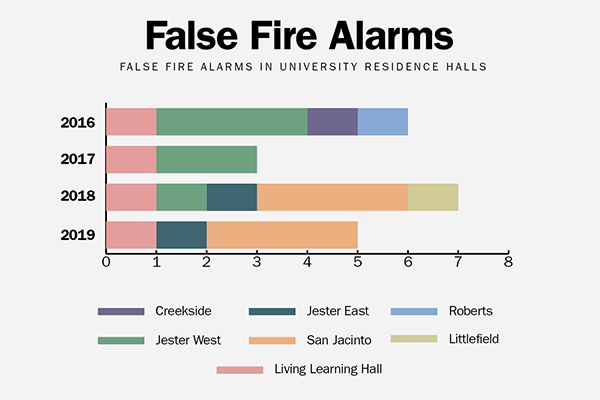Unwarranted fire alarms occur on campus a couple of times per month at UT and disrupt students from working, sleeping and studying, according to UT Fire Prevention Services.
According to UT public records, seven falsely triggered fire alarms went off in residence halls in 2018 and five have occurred so far this year.
Josh Lambert, UT’s assistant fire marshal, said the term “false alarm” is generally discouraged, and Fire Prevention Services refers to unwanted alarms as “nuisance alarms.” Nuisance alarms happen when the system is functioning as it should be but is activated in response to a condition that is not potentially hazardous, Lambert said.
“Obviously, from the students’ perspective, having these alarms may interrupt classes or business or research,” Lambert said. “We will usually have an inspector responding. We should have one or two folks, at least, from UTPD responding and folks from Fire Safety System Shop, who does maintenance on all the systems, responding. … That is also part of the reason why we’re here, so it is anticipated.”
Peter Scheets, the UT Police Department assistant chief of police and chief of operations, said UTPD investigates whether alarms were activated with criminal intent. He said UTPD monitors all fire alarm systems so in the event of any fire alarm on campus, the department is also called to secure the scene.
“Every time there’s a fire alarm, we respond initially to assist in evacuation and also to assist Austin Fire Department personnel because we’re more familiar with the layout of the building (and) where the fire panels are,” Scheets said.
Lambert said UTPD is usually notified within a few seconds of an alarm going off. He said AFD will be called from the station, and its average travel time is about seven minutes.
“Depending on the nature of the issue, (AFD) will have to go investigate the calls,” Lambert said. “It can probably be between 10 to 15 minutes, depending on the nature of the issue inside.”
Neuroscience junior Shreya Kulkarni said she was in the Texas Union studying with a friend three weeks ago when a fire alarm went off. She said employees said it was not a drill and evacuated the building.
“We had just gotten into a study room,” Kulkarni said. “We ended up moving to a different building after we got kicked out because we didn’t know how long it was going to take. We had finally found a quiet place to study, and then we had to leave as soon as we found it. It was annoying.”
According to the 2019 Annual Security and Fire Safety report, only one actual fire was reported in on-campus residence halls — at San Jacinto Residence Hall.
Lambert said Fire Protection Services provides training to any employees who request it. He said New Student Services has begun informing students this year about UT’s fire systems and of what to do in the event of a fire alarm.
“Resident assistants in our residence halls get training every year,” Lambert said. “Students who live on campus have more frequent fire drills in the dormitories, so they get a lot of experience working there.”





















